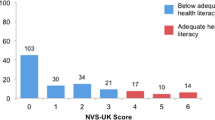Abstract
Objective
Our objective was to evaluate the health literacy and its association with sociodemographic variables, the self-perception of health and the presence of chronic conditions in primary health-care patients.
Methods
A cluster survey was conducted. A total of 1,500 patients were enrolled. Functional health literacy was measured by the Serbian version of the Short Test of Functional Health Literacy in Adults. Chi-square testing and multilevel logistic regression analyses were applied.
Results
We found that health literacy was inadequate and marginal in 436 (32%) and 195 participants (14.4%), respectively, and adequate in 730 participants (53.6%). A better health literacy score was present among the following participants: younger, employed, and those with a high level of education, a good self-perception of health, a good socioeconomic status and no chronic conditions. If, on multilevel analysis, the primary health center and individual variables were included, the probability for adequate health literacy was higher among younger, employed, higher educated and those with no chronic conditions.
Conclusions
Primary health-care patients do not have the literacy skills necessary to function adequately in the health-care environment.
Similar content being viewed by others
References
AHRQ, Agency for healthcare research and quality (2004) Literacy and health outcomes: summary of evidence report/technology assessment number 87 January 2004. http://www.ahrq.gov/clinic/epcsums/litsum.htm. Accessed 30 Oct 2008
AMA, American Medical Association (1999) Ad Hoc Committee on Health Literacy for the Council on Scientific Affairs. JAMA 281:552–557
Baker DW, Gazmarrian JA, Sudano J (2000) The association between age and health literacy among elderly persons. J Gerontol B Psychol Sci Soc Sci 55(6):S368–S374
Berkman ND, DeWalt DA, Pignone MP, Sheridan SL, Lohr KN, Lux L et al (2004) Literacy and health outcomes. Agency for Healthcare Research and Quality, Rockville
CCL (2007) Health literacy in Canada: initial results from the international adult literacy and skills survey. Canadian Council on Learning, Ottawa
Davis TC, Long SW, Jackson RH (1993) Rapid estimate of adult literacy in medicine: a shortened screening instrument. Fam Med 25:391–395
Eichler K, Wieser S, Brügger U (2009) The costs of limited health literacy: a systematic review. Int J Public Health 54:313–324
Gazmamarian J, Baker WD, Williams WD, Parker MR, Scott LT, Green CD et al (1999) Health literacy among Medicare enrollees in a managed care organization. JAMA 281(6):545–551
Ginde AA, Weiner SG, Pallin DJ, Camargo CA (2008) Multicenter study of limited literacy in emergency department patients. Acad Emerg Med 15(6):577–580
Howard DH, Gazmararian J, Parker RM (2005) The impact of low health literacy on the medical costs of Medicare managed care enrollees. Am J Med 118:371–377
Institute of Public Health of Serbia (2009) Health of Population of Serbia. Analytical study 1997–2007. IPHS, Belgrade
Johnston MV, Diab ME, Kim SS, Kirshblum S (2005) Health literacy, morbidity and quality of life among individuals with spinal cord injury. J Spinal Cord Med 28:230–240
Kalichman SC, Benotsch E, Suarez T, Catz S, Miller J, Rompa D (2000) Health literacy and health-related knowledge among persons living with HIV/AIDS. Am J Prev Med 18(4):325–331
Kickbusch I, Wait S, Maag D (2006) Navigating Health. The role of Health Literacy. Alliance for health and the future, International Longeviti Center-UK, London
Kirch I, Jungeblut A, Jenkins L (2002) Adult literacy in America: A first look at the findings of the National Adult Literacy Survey, vol 201, 3rd edn. US Department of Education, National Center for Education, Washington, DC
Mancuso CA, Rincon M (2006) Impact of health literacy on longitudinal asthma outcomes. J Gen Intern Med 21:813–817
Merlo J, Chaix B, Yang M, Lunch J, Rastam L (2005) A brief conceptual tutorial of multilevel analysis in social epidemiology: linking the statistical concept of clustering idea of contextual phenomena. J Epidemiol Community Health 59:443–449
Nutbeam D (2000) Health literacy as a public health goal: a challenge for contemporary health education and communication strategies into the 21st century. Health Promot Int 15:259–267
OED Online. Oxford English Dictionary 2003:http://www.dictionary.oed.com. Accessed 16 July 2008
Parker RM, Baker DW, Williams MV (1995) The test of functional health literacy in adults: a new instrument for measuring patients’ literacy skills. J Gen Intern Med 10:537–541
Schillinger D, Grumbach K, Piette J, Wang F, Osmond D, Daher C et al (2002) Association of health literacy with diabetes outcomes. JAMA 288(4):475–482
Schillinger D, Piette J, Grumbach K (2003) Closing the loop: physician communication with diabetes patients who have low health literacy. Arch Intern Med 163(1):83–90
Sperber AD, Devellis FR, Boehlecke B (1994) Cross-cultural translation: methodology and validation. J Cross Cult Psychol 25:501–524
Sudore RL, Mehta KM, Simonsick EM, Harris TB, Newman AB, Satterfield S et al (2006) Limited access in older people and disparities in health and healthcare access. J Am Geriatr Soc 54:770–776
Wagner C, Knight K, Steptoe A, Wardle J (2007) Functional health literacy and health-promoting behaviour in a national sample of British adults. J Epidemiol Community Health 61:1081–1090
Wide Range Inc (1993) Wide Range Achievement Test (WRAT 3). Wide Range Inc, Wilmington
Wolf SM, Gazmarian AJ, Baker WD (2005) Health literacy and functional status among older adults. Arch Intern Med 165:1946–1951
Author information
Authors and Affiliations
Corresponding author
Rights and permissions
About this article
Cite this article
Jovic-Vranes, A., Bjegovic-Mikanovic, V., Marinkovic, J. et al. Health literacy in a population of primary health-care patients in Belgrade, Serbia. Int J Public Health 56, 201–207 (2011). https://doi.org/10.1007/s00038-010-0181-0
Received:
Revised:
Accepted:
Published:
Issue Date:
DOI: https://doi.org/10.1007/s00038-010-0181-0




